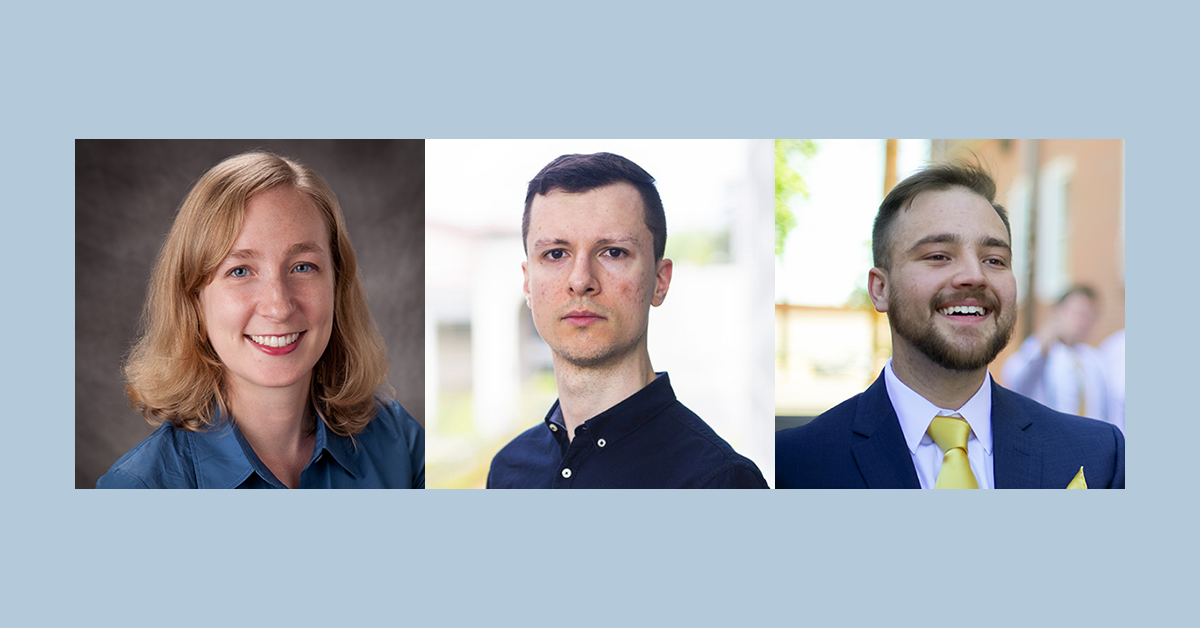We warmly welcome three Emory University doctoral candidates who join the Emory Center for Digital Scholarship (ECDS) as graduate fellows for 2021-2022! In this introductory blog post, each of our fellows have provided a brief introduction about themselves and their fellowship role below.
Emory Libraries/Emory Center for Digital Scholarship (ECDS) offer the Digital Humanities and Data Services fellowship positions annually (in partnership with the Laney Graduate School) to advanced graduate students expecting to complete their dissertations by the end of the fellowship period. These fellows support projects in digital scholarship, computer-based research, and electronic publishing; our fellows collaborate with interdisciplinary teams of researchers, librarians, writers, and technologists; and they serve as project researchers, content administrators, editorial associates, and reviewers for the academic year. This also marks the third year that ECDS has offered the David R. Scott fellowship in conjunction with work on the Apollo 15 collection, donated to Emory University by Commander David Scott. (You can learn more about the Apollo 15 Learning Hub in a previous post.)
Stephanie Bryan; Digital Humanities Fellow
 Stephanie Bryan is a PhD candidate in the Department of History at Emory University. Her dissertation traces the habitat losses and decreased biodiversity caused by cotton and other monocultures in the southeastern United States. At the same time, it reveals how a diverse array of human practices actually supported a few marginalized indigenous species, such as opossums, persimmons, muscadines, and pokeweed. Her dissertation examines the ways in which these plants and animals, often labeled as “weeds” and “pests”, persisted and entered into the diets, cultures, economies, and politics of Euro-Americans and people of African descent, from slavery through Jim Crow.
Stephanie Bryan is a PhD candidate in the Department of History at Emory University. Her dissertation traces the habitat losses and decreased biodiversity caused by cotton and other monocultures in the southeastern United States. At the same time, it reveals how a diverse array of human practices actually supported a few marginalized indigenous species, such as opossums, persimmons, muscadines, and pokeweed. Her dissertation examines the ways in which these plants and animals, often labeled as “weeds” and “pests”, persisted and entered into the diets, cultures, economies, and politics of Euro-Americans and people of African descent, from slavery through Jim Crow.
As the 2021-2022 ECDS Fellow in Digital Humanities, Stephanie will work as an associate editor for the open-access, peer-reviewed journal Atlanta Studies. She will assist with the various aspects of digital publishing, from soliciting submissions to providing internal reviews, copy editing, and updating the website. Stephanie brings to the fellowship a strong interest in digital mapping and looks forward to applying her skills in ArcGIS, Adobe Illustrator, and other programs to help produce maps and other visual graphics for the journal’s publications.
Aliaksandr Zaretski; Data Services Fellow
 Aliaksandr Zaretski is a PhD candidate in Economics. His dissertation is in the field of macroeconomic theory with a general focus on the optimal design of government policies to achieve macroeconomic and financial stability. He has studied the interaction between banking and sovereign debt crises, optimal monetary policy in the presence of financial constraints, and optimal macroprudential policy. He co-taught and assisted in both graduate and undergraduate economics courses and served as an R lab instructor in an introductory statistics class. He has also worked as a research assistant at the Federal Reserve Bank of Atlanta, studying the dynamics in income inequality, income mobility, and economic growth, as well as the effects of immigration and offshoring on the U.S. labor market. His research methods include designing, solving, and estimating mathematical models of economic dynamics.
Aliaksandr Zaretski is a PhD candidate in Economics. His dissertation is in the field of macroeconomic theory with a general focus on the optimal design of government policies to achieve macroeconomic and financial stability. He has studied the interaction between banking and sovereign debt crises, optimal monetary policy in the presence of financial constraints, and optimal macroprudential policy. He co-taught and assisted in both graduate and undergraduate economics courses and served as an R lab instructor in an introductory statistics class. He has also worked as a research assistant at the Federal Reserve Bank of Atlanta, studying the dynamics in income inequality, income mobility, and economic growth, as well as the effects of immigration and offshoring on the U.S. labor market. His research methods include designing, solving, and estimating mathematical models of economic dynamics.
As the Data Services fellow, he will be involved in consulting with Emory students, faculty, and staff on questions about data and helping with ECDS workshops (which he himself attended in the past on multiple occasions).
Jonathan Groce; David R. Scott Fellow

Jon Groce is a PhD candidate in the New Testament course of study in Emory’s Graduate Division of Religion. His scholarly work has considered gender, empire, and visual culture, mostly in relationship to the book of Revelation. He is working on a dissertation about the rhetorical impact of Revelation’s anti-imperial polemic. Considering the visual representation of “barbarians” in Hellenistic and Roman artwork in and around the areas to which the book of Revelation was originally addressed, the work argues that certain images in Revelation would have imputed empire with the barbarism typically associated with the people beyond imperial borders. He hopes to build a career that helps faith communities approach the Bible in healthy ways.
As the 2021-2022 David R. Scott fellow, Jon’s work in the ECDS is focused on the Apollo 15 Learning Hub. Continuing the labors of digital scholarship made by current and previous contributors to the Hub, Jon works on optimizing the accuracy and clarity of the learning materials available on the Hub and creating materials that help educators and researchers take advantage of its wealth of information.
